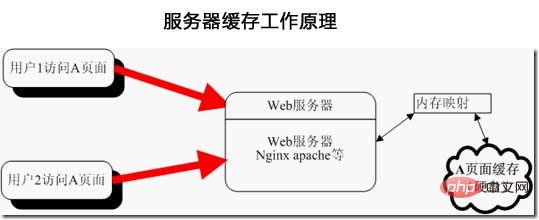Home >Operation and Maintenance >Apache >What are the cache modules of apache server?
What are the cache modules of apache server?
- (*-*)浩Original
- 2019-11-28 14:46:203319browse

apache server cache
apache server cache working principle (Recommended study :Apache server )

The above is a simple flow chart:
User 1 accesses page A , the server parses page A and returns it to user 1. At the same time, it does a certain mapping on the server memory and caches page A on the hard disk.
User 2 accesses page A, and the server directly finds the corresponding page cache based on the mapping on the memory. , directly returned to user 2, thus reducing the server's repeated parsing of the same page.
The difference between server cache and browser cache:
Server cache caches the page to the hard disk on the server, while browser cache caches the page to the user in your own computer.
Enable the mod_file_cache module to cache static files
The action of opening a file itself is a cause of delay, especially opening files in network file systems.
Apache can avoid this delay by maintaining a buffer of file descriptors for highly used files. Rarely changed files that are requested frequently are cached as a technique to reduce server load.
mod_file_cache provides two techniques for caching frequently requested static files.
CacheFile exists in Apache. The most basic buffering method is file handle (file-handle) buffering implemented by mod_file_cache. Rather than caching the file contents themselves, this buffer maintains a table of open file descriptors that hold file handles to files specified using the CacheFile directive in the configuration file.
The CacheFile directive instructs Apache to open a file at startup and reuse the file handle for all subsequent accesses to the file.
//Example CacheFile/usr/local/apache2/htdocs/index.html
If you plan to use this method to cache a large number of file handles, you must ensure that the operating system handles files that are opened at the same time. The limit on the number of files is sufficient.
Although using CacheFile will not cause the contents of the file to be cached, it will cause all changes to the file to not take effect while Apache is running. The contents of the files used to serve will remain unchanged since Apache was started. If the file is deleted while Apache is running,
Enable the mod_cache module to cache dynamic files
mod_cache has two storage management modules:
mod_disk_cache, a disk-based storage management module.
mod_mem_cache, a memory-based storage management module.
mod_mem_cache can be configured for two different operating modes: ① cache open file descriptors; ② cache objects on the heap.
mod_mem_cache can be used to cache locally generated content, and can also be used to cache content output by the backend server for mod_proxy in reverse proxy mode (see ProxyPass).
mod_mem_cache: A memory-based cache that serves content directly from the system's memory is usually the fastest way to serve content. Reading files from a disk controller, or worse, from a remote network, is orders of magnitude slower.
Disk controllers usually involve physical actions, and accessing the network is limited by network bandwidth, while accessing memory usually only takes a few nanoseconds. Memory is perhaps the most expensive memory per byte available, and it is important to ensure that it is used to its full potential.
Caching files in memory will result in a reduction of available system memory. As we will see, this is not a big problem in the presence of memory buffers for the operating system.
But when using Apache's own memory buffer, it is very important to ensure that too much memory is not allocated for the buffer. Otherwise, the operating system will use swap (virtual memory/swap area), which may cause a sharp decrease in performance. The operating system caches almost all modern operations.
Content caching of the Apache server
Since Apache 2.2, two caching modules are officially used: mod_cache and mod_file_cache. These buffering systems provide a powerful way to speed up HTTP processing on origin web servers and proxy servers.
Explanation of the official manual The difference between mod_cache and mod_file_cache: The implementation of mod_cache cache relies on two modules mod_mem_cache and mod_disk_cache, which provide intelligent HTTP buffering.
The content itself is stored in the buffer, and the purpose of mod_cache is to manage various HTTP headers and options that control content buffering capabilities. It can handle both local content and proxy content.
mod_cache is designed for both simple and complex cache configurations to handle proxy content, dynamic local content, and local files that change over time where access must be accelerated.
Read how to enable mod_cache module. mod_file_cache implements a more basic, but in some cases more efficient, form of caching that avoids the maintenance complexity required to proactively ensure URL caching capabilities. mod_file_cache does this by providing file-handles and memory mappings. -mapping) trick to maintain a file buffer since Apache was last started.
The above is the detailed content of What are the cache modules of apache server?. For more information, please follow other related articles on the PHP Chinese website!

